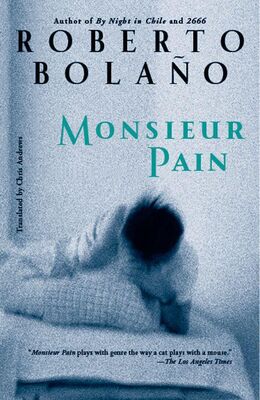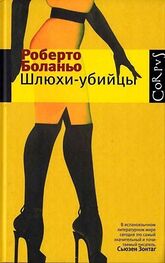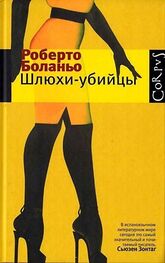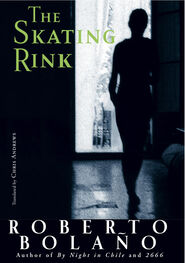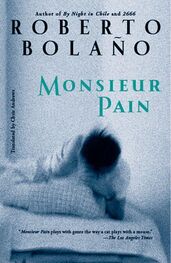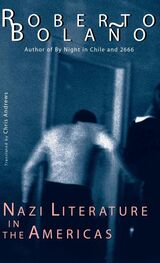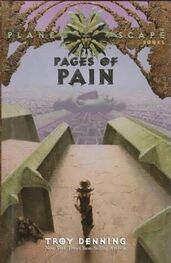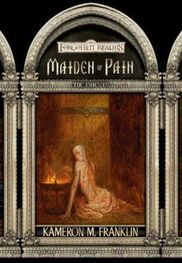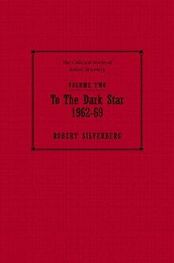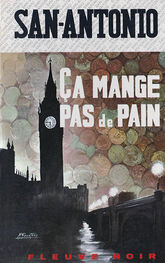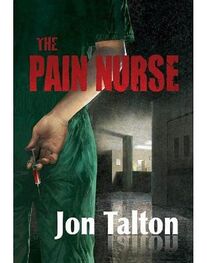Roberto Bolaño
Monsieur Pain
P. Does the idea of death afflict you?
V. (Very quickly.) No — no!
P. Are you pleased with the prospect?
V. If I were awake I should like to die, but now it is no matter. The mesmeric condition is so near death as to content me.
P. I wish you would explain yourself, Mr Vankirk.
V. I am willing to do so, but it requires more effort than I feel able to make. You do not question me properly.
P. What then shall I ask?
V. You must begin at the beginning.
P. The beginning! But where is the beginning?
“Mesmeric Revelation”, Edgar Allan Poe
Many years ago, in 1981 or 1982, I wrote Monsieur Pain . Its fate has been haphazard and erratic. Under the title The Elephant Path it won the Felix Urubayen prize for a short novel, awarded by the Toledo City Council. Not long before, it had been short-listed in another provincial competition, under a different title. I won three hundred thousand pesetas in Toledo. And around a hundred and twenty thousand in the other city, as I seem to recall. The Toledo City Council published the book and made me a judge for the following year. In the other provincial capital they forgot about me even sooner than I forgot about them, and I never found out whether or not the novel had been published there. All this is recounted in a story in Last Evenings on Earth . Time, that consummate joker, has subsequently sent a number of major prizes my way. But none of them has meant as much to me as those awards scattered over the map of Spain: buffalo prizes I had to go hunting like a redskin whose life is on the line. Never have I felt as proud or as wretched to be a writer. There’s not a lot more I can say about Monsieur Pain . Almost all the events related actually occurred: Vallejo’s hiccups, the carriage — a horse-drawn carriage — that ran over Curie, his last experiment, or one of his last, which touched on certain aspects of mesmerism, the doctors who were so negligent in their treatment of Vallejo. Even Pain is real. Georgette mentions him on a page of her passionate, bitter, helpless memoirs.
On Wednesday the sixth of April, at dusk, as I was preparing to leave my lodgings, I received a telegram from my young friend Madame Reynaud, requesting, with a certain urgency, my presence that evening at the Café Bordeaux, on Rue de Rivoli, relatively close to where I live, which meant that if I hurried, I could still arrive punctually at the specified time.
The first indication that I had just been drawn into a singular episode presented itself immediately: as I was going down the stairs I came across two men climbing up to the third floor. They were speaking Spanish, a language I do not understand, and wearing dark trench-coats and broad-brimmed hats, which, since they were below me on the stairs, obscured their faces. Because of the semi-darkness that generally prevails in the stairwell, but also because of my quiet way of moving, they failed to notice my presence until I was right in front of them, a mere three steps away, at which point they stopped talking, and instead of stepping aside and allowing me to continue on my way down (the stairs are wide enough for two but not three people abreast), they looked at each other for a few moments that seemed to be fixed in a simulacrum of eternity (I should stress that I was a few steps above them), and then, slowly, very slowly, they trained their gazes on me. Policemen, I thought, only policemen have preserved that way of looking, an atavism that goes back to hunting and dark woods; then I remembered that they had been speaking Spanish, so they could not have belonged to the police force, or not the French police force, at any rate. I thought they were readying themselves to speak, to jabber as disoriented foreigners always do, but instead the one directly in front of me lurched aside in the clumsiest imaginable fashion, and pressed against the shoulder of his companion in a way that surely must have been uncomfortable for both of them, at which point, having pronounced a brief and unreciprocated greeting, I was able to continue my descent. Out of curiosity, when I reached the first-floor landing, I glanced back at them: they were still there, standing on the very same steps, I would swear, faintly illuminated by a globe suspended over the landing above them, and — even more surprisingly — still holding the exact position they had adopted in order to let me pass. As if time had stopped, I thought. When I reached the street I found it was raining, and I forgot all about that incident.
Madame Reynaud was seated against the far wall of the restaurant, her back held very straight, as usual. She seemed impatient, although when she caught sight of me her expression softened, as if a sudden relaxation were the appropriate manner in which to indicate that she had recognized me and was waiting.
“I want you to see the husband of a friend of mine,” was the first thing she said, as soon as I took my place in front of her, facing an enormous wall-mirror, in which the restaurant could be surveyed almost in its entirety.
Guided by some recondite analogy, I remembered the face of her young husband, who had died not long before.
“Pierre,” she repeated, stressing each word, “you must see my friend’s husband, professionally, it’s urgent.”
I think I ordered a glass of mint cordial before asking what illness Monsieur. .
“Vallejo,” said Madame Reynaud, adding, with equal concision, “Hiccups.”
I don’t know why fragmentary images of a face, which could have been the face of the late Monsieur Reynaud, superimposed themselves on the people drinking and chatting at the nearby tables.
“Hiccups?” I asked with a sad smile that was intended to be respectful.
“He’s dying,” my interlocutor affirmed vehemently. “No one knows why; it’s no joke. You have to save his life.”
“I’m afraid,” I whispered, as she looked out the front window, nervously watching the flow of passers-by on Rue de Rivoli, “I’m afraid that if you can’t be more explicit. .”
“I’m not a doctor, Pierre, I don’t understand these things, it’s something I deeply regret, as you know; I always wanted to be a nurse.” Her blue eyes shone furiously. It was true that Madame Reynaud had not pursued advanced studies (in fact she had not pursued any studies at all), but that did not prevent me from considering her a woman of lively intelligence.
Frowning slightly and lowering her eyelashes, with the intonation of someone reciting a text learned by heart, she added:
“Monsieur Vallejo has been in hospital since the end of March. The doctors still don’t know what’s wrong, but one thing is clear: he’s dying. Yesterday he began to suffer from the hiccups. .” She stopped for a moment and looked around at the people in the restaurant, as if attempting to locate someone. “That is, yesterday he began hiccupping constantly and no one has been able to do anything to help him. As you know, in extreme cases, hiccups can be fatal. As if that weren’t enough, he’s running a temperature of more than forty degrees. Madame Vallejo, whom I’ve known for years, called me this morning. She’s alone, with no one to turn to except her husband’s friends, who are almost all South Americans. When she explained her situation, I thought of you, although of course I didn’t promise her anything.”
“I’m honored by your confidence,” I managed to whisper.
“I have faith in you,” she replied immediately
Faith is the first requirement for love, I thought. She looked fragile. Her eyes were dry (why should they not have been?) and seemed to be unhurriedly studying the shoulders of my jacket.
Читать дальше